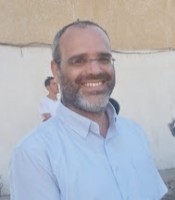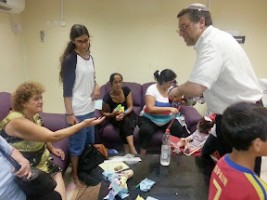Sunday July 27:
JG, a friendly woman in her 50s, lives in a poor section of the poor Israeli city of Dimona (famous for its nuclear facilities). She told me this afternoon that six and half years ago her daughter finally decided to divorce her husband. The police arrested him for threatening to burn her alive, along with their five children and JG. Before that he had been drinking and beating her and the kids. They all lived together in JG’s tiny apartment, mostly sleeping on mats on the floor.
Hodayah and Michele with R. Yehudah Oppenheimer (left). OU Israel’s Oraita club in Dimona. A shelter (right).
Hodayah and Michelle are 14-year old giggling buddies. Delighted to pose for a photo with R. Yehudah Oppenheimer of the Young Israel of Forest Hills, NY, they are showing off their handiwork: a dish of henna they smeared on people’s palms as a segulah (a folk act to bring good fortune) for finding a good spouse for oneself or one’s children.
Chatting with them, I discovered that they only go to school when they feel like it. After listening to me as I naively encouraged them to focus on their school work, on finding good jobs, and only then on finding husbands, the truth came out: school is a joke, so why should they go? Kids don’t pay attention to their teachers or the material being taught, preferring instead to chat with one another on their phones. Most kids don’t bother to go.
JG told me that her parents came from Algeria and Tunisia. Other families in the neighborhood are from Russia, India, and Morocco. They are an integral part of the glorious ingathering of our exiles from all parts of the world to our homeland. Yet they are at the lowest socioeconomic rungs of society. Poor, often unemployed, facing varied familial woes, sometimes disabled, poorly educated, and living in ugly surroundings. Their future is without joy or hope. Many families are sustained by government programs, and have no able-bodied working adults in the home. Fathers — like JG’s former son-in-law and her own husband whom she divorced — are often absent or deadbeats. They leave overwhelmed mothers alone to care for themselves and their children.
OU Israel identified this community and others like it around the country in order to try to break the cycle of poverty and hopelessness. The first focus was on the youth: to give them hope and good role models, and to keep them away from crime, the streets, and their depravities. OU Israel workers and volunteers in Dimona cleaned out a formerly filthy bomb shelter in the middle of a housing project. Then they stocked it with fun and food, and staffed it with idealistic young men and women, many of whom have moved into the neighborhood to integrate themselves into its daily life.
Chaim Pelzner (left). Rabbi Kornblau distributing games and candy (right).
OU Israel’s Director of Programming Chaim Pelzner told me that they soon discovered that this humble youth center transformed not just the kids, but also served as a magnet for many of the neighborhood’s adults.
Wholesome hope, old-fashioned caring, and abundant Ahavat Yisrael (love for fellow Jews) attract and affect everyone in the entire neighborhood, young and old alike.
And so, delivering toys, games, and tasty treats this afternoon to this superb project was personally gratifying. It was delightful to see the obvious joy on the faces of young and old, for whom hanging out (and – in these days of rockets — sleeping) in a suffocating bomb shelter is a dramatic and profusely appreciated improvement in their living conditions. Our Sages’ teach in Pirkei Avot (Ethics of the Fathers) that while “you need not complete the work, neither can you desist from it.” This allowed for a sense of modest accomplishment, even while realizing how modest such contributions are.
It is obvious that addressing such complex societal problems requires the joint efforts of many parties: government programs, good schools, personal commitments, Divine grace, and more. Private charitable initiatives — such as the OU Israel’s efforts in Dimona and elsewhere around Israel — are a critical part of these comprehensive efforts.
As Religious Zionists, we are committed to building a holy, righteous society which partners with God in all the above ways to bring our Torah’s holy vision to fruition in our holy homeland: Israel. Specifically, I believe that all these activities are the practical fulfillment of the vision implicit in a pair of blessings we recite one after the other, three times each day in the Amidah.
First, we pray for the ingathering of our exiles: “Blessed are You, Hashem, who gathers in the scattered members of His people.” Thank God, the half of world Jewry who are privileged to be Israeli citizens – in Dimona and throughout the Land! – represent millions of fulfillments of this prayer. Immediately afterward, we bless God again, requesting that He help us to create a just society in Israel for those very ingathered Jews: “Blessed are You, Hashem, who Loves Righteousness (Charity) and Justice.” Although this work is certainly not only ours to complete, let each of us make sure that we are truly doing our part.




